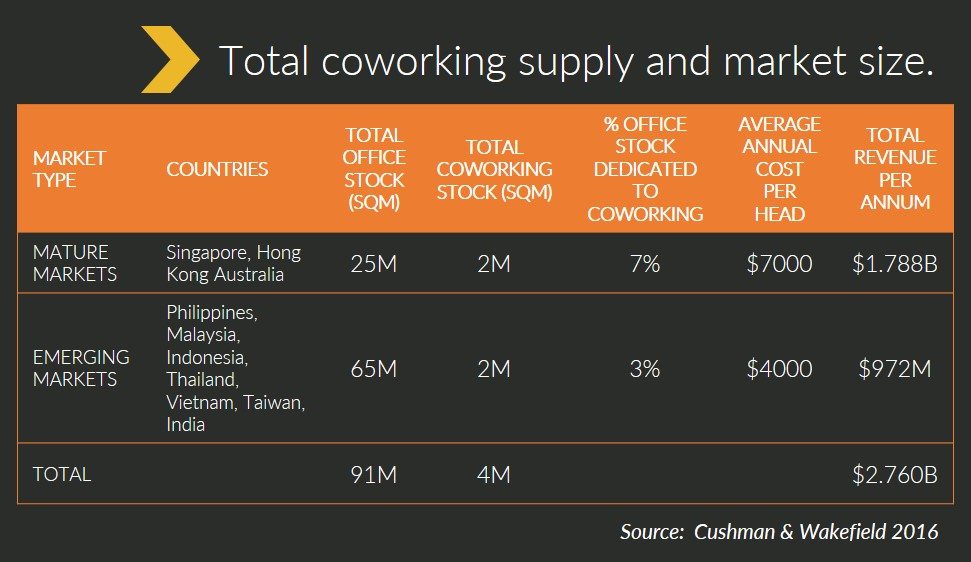A FlySpaces report revealed the state of coworking space industry in Southeast Asia, where emerging economies and tech-savvy population are signs of a potential market

Online marketplace for office spaces FlySpaces recently released a report on the state of coworking spaces in Southeast Asia (SEA), revealing the industry’s rapid growth in the region.
While in mature markets such as Hong Kong and Singapore coworking spaces occupy seven per cent of the two million square meters of supply, in the rest of SEA the number lies at three per cent. But considering the region’s relatively later start at the field, the number is still considered a great news for the industry.
In fact, property and real estate consultancy firm Cushman & Wakefield projects that coworking spaces will occupy 15 per cent of total office supply in Southeast Asia by 2030.
Also Read: Chinese coworking space aims for international startups: Q&A with SimplyWork CEO Guo Yifan
“Because Southeast Asia includes the world’s fastest growing economies and a much more tech savvy population than other emerging regions, there is no question about the market potential found here,” says FlySpaces CEO and Co-Founder Mario Berta.
The report was based on the company’s survey to coworking spaces in mature markets such as Singapore and Hong Kong, and emerging markets such as the Philippines and Malaysia.
The following are key take-aways from the report.

Also Read: Indonesia’s association for coworking spaces is officially launched
Even the big guys are doing it
Coworking spaces are often associated with startups, freelancers, and mobile workers, but recent trends revealed that even big corporations and government agencies are starting to embrace the concept.
CapitaLand in Singapore and Ayala Land in Manila are examples of major property groups that have restructured their business models and expanded their portfolios to include coworking spaces.
In fact, CapitaLand has entered into a joint venture with Collective Works to support up to 250 “high performance businesses” in a coworking model business center of over 22,000 square feet.
Also Read: Awfis on-demand: This app lets you book a coworking space in India
In the banking sector, HSBC had also moved its digital and transformation team into WeWork in Hong Kong. With more than 300 hot desks booked, HSBC is now the coworking space’s biggest member firm in Asia Pacific so far.
Even government agencies have also begun to embrace coworking spaces, such as Malaysia’s government-run incubation and acceleration centre MaGIC.
According to Programme Director Jowynne Khor, today attitudes have changed and infrastructure has developed enough to encourage collaboration between the government and private corporations, thereby “closing the gap” and moving the Malaysian economy forward.
In an e-mail to e27, FlySpaces Marketing Manager Nicole Adarme confirmed that the trend is predicted to continue rising, especially if coworking spaces manage to educate traditional industries on its practical benefits and cost-efficiencies.
The fact that a greater variety of clients had started to embrace the coworking concept can also be a good news for industry players seeking to build sustainability.
“All operators are exerting lots of effort to differentiate, but we believe it is not a safe bet to focus only on tech startups. They are just not enough, on the other side, SMEs [also] have lots of opportunity,” she wrote.
Also Read: A full stop: Indonesian coworking space Comma closed down business
Beat of their own drums
Other notable point from the report is how coworking spaces in each SEA country offer their own distinctive features, that represents the home country’s culture.
A good example is JustCo, which the report dubbed as Singapore’s largest coworking space in terms of both floor area and membership. As a reflection of the country’s culture of efficiency, JustCo uses an internal app to curate message boards and partnership or collaboration invitations.
There is also a strong emphasis on “promoting creativity, motivating individuals, and inspiring growth” by hosting networking events or business workshops.
Meanwhile for Hong Kong-based Urban Serviced Works, the main focus is on design and sustainability, as well as health and wellness. Apart from designing the office to optimise working conditions in a city with limited spaces, Urban also implemented eco-friendly initiatives such as reusing or recycling.
It also aims to promote healthier lifestyle to its members by offering green tea and lemon water in the pantries, incorporating ‘salad Mondays’, holding periodic yoga classes in its event space, and extending gym memberships to its community.
—
Image Credit: 123RF Stock Photo
The post In Southeast Asia, coworking spaces are no longer just for startups and freelancers appeared first on e27.